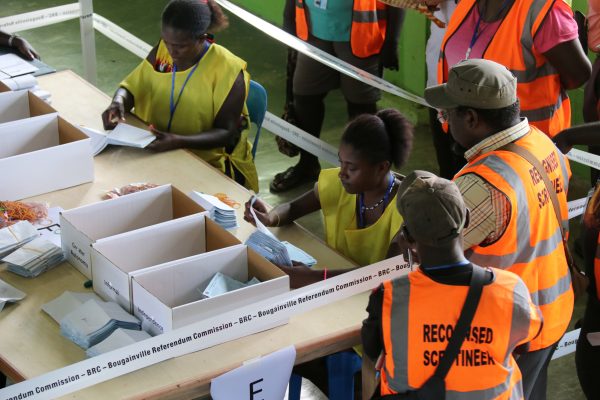In 2019, a series of political leadership transitions occurred throughout the region. In Papua New Guinea (PNG), Prime Minister Peter O’Neill — the second longest-serving head of government in the country’s history — was ousted in May. He was replaced by his former minister for finance, James Marape.
In September, Tongan Prime Minister ‘Akilisi Pohiva passed away. Following his death there has been a significant shift in Tongan politics with the emergence of the new People’s Party, headed by Pohiva’s successor, Prime Minister Pohiva Tu’i’onetoa.
Elections elsewhere in the Pacific saw further changes. In the Federated States of Micronesia (FSM), Peter Christian lost the presidency when he was not re-elected in the Pohnpei at-large senatorial seat. The long-serving president of Nauru, Baron Waqa, is also out of politics after losing his seat in August. And Tuvalu has a new prime minister, with Kausea Natano taking on the role after the September election.
While the Marshall Islands Nitjela will not elect a president for the incoming term until January, the general elections held in November saw a shift in power from the current government, led by Hilda Heine, to the opposition. Following the general elections in Solomon Islands in April, it was a case of history repeating as Manasseh Sogavare regained the prime ministerial post for a fourth time. Yet his government soon looked to be on shaky ground after the decision to recognise China sparked a cabinet backlash.
While the face of political leadership is changing, politics remains overwhelmingly male-dominated across the independent nations of the region. The number of women in national politics stayed the same across elections in FSM (zero), Nauru (two) and Tuvalu (one). The Marshall Islands election saw the number of women elected decline from three to two, and the possibility of the first female head of government in the independent Pacific Islands losing her position remains. In Solomon Islands, women’s representation is at an all-time high with three MPs (6 per cent).
China continues to gain a greater foothold in the region. In September, Taiwan lost its largest ally in the Pacific when the Prime Minister of Solomon Islands announced his government would officially recognise China. While expected, the switch attracted much criticism within Solomon Islands and exposed rifts within the government. Shortly afterwards, the government of Kiribati also moved to sever ties with Taiwan. While Taiwan still has four remaining allies in the Pacific, the loss of Solomon Islands and Kiribati in quick succession was something of a shockwave.
Perhaps the most major event in the region in 2019 was the long-awaited Bougainville referendum. The results saw an overwhelming majority of Bougainvilleans vote for independence from PNG. With a turnout of around 85 per cent, 97.7 per cent voted for independence while just 1.7 per cent voted to remain within PNG under greater autonomy arrangements. While a resounding result, the referendum is non-binding, with upcoming negotiations between the Bougainville and PNG governments set to determine the future political status of Bougainville.
The Bougainville vote is just one of a series of referenda on self-determination to be held in the region. In October 2019, the date of the second New Caledonian referendum was decided. Following a November 2018 poll in which 57 per cent voted ‘no’ to independence, there are provisions for up to two further referenda to take place before 2022. The next vote will be held on 6 September 2020. In the state of Chuuk in FSM, a referendum on independence — already delayed several times — has been scheduled to take place in March 2020.
At the 2018 Pacific Islands Forum in Nauru, the Boe Declaration redefined regional security, recognising climate change as the ‘single greatest threat to the livelihoods, security and wellbeing of the peoples of the Pacific’. Leaders of small island states, including then-prime minister Enele Sopoaga of the host country Tuvalu, went into the 2019 Forum with high hopes for a clear statement on climate action.
For some, the outcome was disappointing. The communique that emerged had all references to coal removed, although the phrase ‘climate change crisis’ was retained after initial indications that it might be taken out. Sopoaga commented ‘I think we should have done more work for our people’ while Fijian Prime Minister Frank Bainimarama tweeted ‘watered-down climate language has real consequences — like water-logged homes, schools, communities, and ancestral burial grounds’.
The year ended with another push for urgent climate action at COP25 in Madrid. Pacific delegates were well-represented at the annual meeting and expressed frustration with the inability to reach global consensus on carbon emissions reduction. Climate change remains an existential threat to the Pacific Islands and an enduring sore point in relations with external players, including Australia.
What will 2020 bring for the region? Elections are looming in Vanuatu, Kiribati, Niue and Palau, as well as New Zealand. With two votes on self-determination scheduled and the beginning of negotiations on the future status of Bougainville, issues of political independence will be high on the Pacific agenda. In light of the events of 2019, other key external players in the region will be seeking ways to counterbalance China’s rising influence. And Pacific leaders will be hoping for more concrete global action on climate change as the world heads towards a tipping point.
Kerryn Baker is a Research Fellow in Pacific Politics with the Department of Pacific Affairs, The Australian National University.
This article is part of an EAF special feature series on 2019 in review and the year ahead.

